Neither of those sound like good news for Oracle Health. After the lofty proclamations of the last couple years. still…
News 3/25/15
Top News
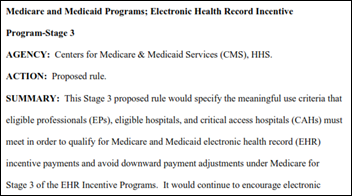
A brief preliminary statement from the American Hospital Association on the Meaningful Use Stage 3 draft says the government “continues to create policies for the future without fixing the problems the program faces today,” referring to the 2015 flexibility rules. Nobody else has had much to say about the draft, probably because it’s mind-numbingly long, was released late on a Friday yet again, and is increasingly irrelevant to providers who realize the strategic advantages they lost just to collect relatively small taxpayer handouts.
Reader Comments

From Opie: “Re: RelayHealth. Is in negotiations to sell their nursing call center and care management business to a private equity firm. The division has struggled with the business model and profitability for many years. The business has lost several key management members over the past year and they have deployed Rod O’Reilly to make a determination if McKesson can grow RelayHealth or if they should sell the entire business.” Unverified.
From Clinic Director: “Re: MU audit hell update with 96 of our 139 Epic-using providers audited. CMS was responsive and the auditor, Figliozzi and Company, offered to instead perform a fast-track pilot sample. If a EP doesn’t meet MU, the sample will be expanded, but if all EPs in the sample meet MU, the remaining audits will be cancelled and all EP payments will be released. Since we had already gone through so many audits, the remaining audits were cancelled. Great news!” I was impressed with the professional and reasonable response of Peter Figliozzi and CMS following up on the practice’s request. Well done all around.
From HIStalk Fan: “Re: BJC. Their website finally confirms their Epic project.”
HIStalk Announcements and Requests
Let us review 2009’s stellar “HITECH: An Interoperetta in Three Acts” by Ross Martin, MD, MHA and The American College of Medical Informatimusicology. Ross usually makes an inspired appearance at HIStalkapalooza, so perhaps you’ll see him on stage there.
I rarely look at readership stats, but for some reason noticed that Monday’s page views were the second-highest in the seven months since I had to switch stats counters, with 11,084 page views and 8,291 unique visits. January 20 had 13,509 page views for reasons I don’t understand since I hadn’t posted anything unusual.
I don’t consume many healthcare services since I’m healthy (and having worked forever in hospitals, I’m anxious to avoid them), but a recent experience reminded me of why the billing process is so frustrating to consumers. I went to the ED in March 2014 after being urged to go there by the urgent care center doctor (who was of questionable clinical skill) checking out my dizziness that turned out to be nothing, was kept overnight and tested endlessly because I had insurance and the malpractice-wary hospital was reluctant to send me on my way without commendably trying to answer the unanswerable (via a head CT, nuclear stress test, and tons of labs and EKGs, all of which showed nothing abnormal). I received the first bill from the hospital’s contracted ED doctor service nine months later in December 2014, which claimed I needed to pay $1,500 immediately since my account was being reviewed for collection due to the non-response of my insurance company. I left phone and email messages for the ED doctor billing company and was promised a quick response that still hasn’t come. I contacted my insurance company, whose nice lady said the ED doc billing company hadn’t even requested my medical records until nine months after my visit, which violates some sort of policy or law, so they basically told them to take a hike. The insurance company said they would talk to the ED doc billing service, so we’ll see what happens. I have to wonder what’s going on with that billing company that it took nine months to send a bill, but again, inefficiency abounds in healthcare.

What I dread most at the HIMSS conference: as a non-coffee drinker, I’ve always made fun of the mile-long line at Starbucks, which looks like a well-dressed morning rush at the methadone clinic. I’ve started drinking coffee in the morning, so I’ll have to decide if I want or need it badly enough to stand in that line myself. Thank goodness for in-room coffee makers.
The process of getting an HIStalkapalooza invitation hasn’t changed since 2008 – watch for the extensive notices in HIStalk, sign up, and hope you get picked before we run out of spots. Sponsor support allowed me to invite 1,400 people this year vs. 600 last year. Great, I thought – unlike last year, maybe I can get some actual work done instead of arguing with entitled people who think they should have been invited psychically since they didn’t otherwise express interest until after registration was closed. This year’s invitations went out and Lorre has already received over 100 emails from people requesting (sometimes demanding) additional invitations for guests, clients, and executives. They will all be politely turned down as will walk-ins that night – the count has been turned in, badges are being printed, and I’m on the hook personally for the $200 per attendee event cost if we run over our guarantee (like if the traditionally high no-show rate drops unexpectedly below the SWAG estimate we’ve built in). The massive HIStalk organization is maybe two FTEs total and we’re buried in our own pre-HIMSS work, so we don’t have time to individually debate the clearly explained process that 95 percent of people seemed to follow just fine. Last year I was so disgusted I was just going to give some whiner my ticket and hit a bar alone instead, which isn’t off the table for this year either.
I was thinking about the overuse of the word “disruptive,” usually by startups trying to convince investors and prospects that their lack of size and market traction is only temporary. I’d like to see the adjective reserved for companies that not only have the self-assessed potential to disrupt, but have actually done it.
Listening: YelaWolf, small-town rap from Gadsden, AL. I need to listen more to make sure I really like it, but my first impression is positive (other than his apparent need to have his hand planted firmly in his crotch for emotive rapping).
Webinars
March 31 (Tuesday) 1:00 ET. “Best Practices for Increasing Patient Collections.” Sponsored by MedData. Presenter: Jason Bird, director of client operations, MedData. Healthcare is perhaps the last major industry where the consumer does not generally have access to what they owe and how they can pay for their services. Collecting from patients is estimated to cost up to four times more than collecting from payers and patient pay responsibility is projected to climb to 50 percent of the healthcare dollar by the end of the decade. Learn how creating a consumer-focused culture, one that emphasizes patient satisfaction over collections, can streamline your revenue cycle process and directly impact your bottom line.
Acquisitions, Funding, Business, and Stock
Humana reconfigures some of its existing population health businesses under the Transcend name: Transcend, which will offer management services (the former Humana MSO) and Transcend Insights, the IT group (the former Certify Data Systems, Anvita Health, and Nnliven Systems).
Sales
Continuum Health Alliance (NJ) selects Caradigm for population health management.
MedStar Mobile Healthcare (TX) chooses the Infor Cloverleaf Integration Suite.

Maury Regional Medical Center (TN) will implement Professional Charge Capture from MedAptus.
People




Galen Healthcare Solutions promotes Jason Carmichael to CEO , Mike Dow to CIO, Erin Sain to COO, and Justin Campbell to VP of marketing.

Paul Holt (Quality Systems) joins NantHealth as CFO.
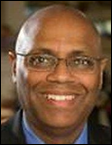
Englewood Hospital and Medical Center (NJ) names Dimitri Cruz (North Shore Long Island Jewish-Lenox Hill Hospital) as VP/CIO.
Barnabas Health (NJ) hires Stephen O’Mahony, MD (Norwalk Hospital) as CMIO.
Announcements and Implementations
The Physician Alliance (MI) expands its rollout of Wellcentive’s population health management solution.
Athenahealth says 98.2 percent of its AthenaOne users successfully attested to Meaningful Use Stage 2 in 2014. It also extends its MU and ICD-10 guarantee program to PQRS reporting and MSSP quality measures.
Hearst Health and the Jefferson School of Population Health of Thomas Jefferson University create a $100,000 award for outstanding achievement in managing or improving wellness.
SAP fixes bugs in its EMR Unwired mobile clinician app that would have allowed hackers to add phony information or change existing data.
I missed this item from a few weeks ago: Walgreens adds information from PatientsLikeMe to its personal health dashboard, allowing people who are taking a particular medication to see what side effects others have reported. Most side effects are subjective and questionably attributed to a drug that has no physiologic rationale (“Tylenol makes me hungry”), so this development is both brilliant and worrisome as patients may fail to consider that every drug has side effects, most side effects are rare and transient, and the prescriber has already weighed the risk vs. benefit. Yelp is great for finding a restaurant based on the sometimes iffy reviews of people you don’t know, but I’m not sure the science of medicine is improved by patients reacting to anecdotal reports.
Technology
Robert Wood Johnson Foundation gives Partners HealthCare a $468,000 grant to help people choose, buy, and use fitness trackers to create a personal fitness plan, which will be followed by a study of volunteer users that will look at outcomes. .
Richmond-based lab vendor HDL will pay $50 million to settle DOJ charges that it gave doctors $20 per blood sample in kickbacks. HDL made hundreds of millions of dollars running cardiac biomarker tests, claiming that it paid doctors only because its competitors did. The company’s three co-founders pocketed $50 million in distributions in three years, while the two owners of its contracted marketing company personally took home $173 million.
Vox questions whether the dramatic rise in medical studies leads to ungrounded public enthusiasm for miracle cures, nearly all of which never pan out. Stats: only 6 percent of submitted single-study journal articles are accepted; of 49 highly cited studies, 14 were later proven wrong or had less impact than originally thought; and 85 percent of annual global research spending is wasted on studies that are poorly designed or redundant. It partially blames news outlets that don’t understand that “new” isn’t definitive when it comes to medical research – it’s the old, unexciting studies that have been validated by further research that change the human health.
Someone tweeted out this brilliant article that has healthcare startup implications, “The Battle Is For The Customer Interface.” Uber doesn’t own cars, Facebook doesn’t create content, and Airbnb doesn’t own real estate. “These companies are indescribably thin layers that sit on top of vast supply systems ( where the costs are) and interface with a huge number of people ( where the money is). There is no better business to be in … Our relationships are no longer with the service providers … In the modern age, having icons on the homepage is the most valuable real estate in the world, and trust is the most important asset. If you have that, you’ve a license to print money until someone pushes you out of the way.”
Sponsor Updates
- RelayHealth Financial announces a new version of its RelayAccount online patient billing solution.
- Meritage ACO (CA) announces that it has lowered its readmission rate to 10.2 percent using an evidence-based hybrid care model and ZynxCarebook care transition on mobile devices.
- Impact Advisors posts “Meaningful Use Stage 3: Summary & Early Impressions.”
- ADP AdvancedMD offers “6 facets of patient safety within a small private practice.”
- Capsule Tech will exhibit at the HIMSS Middle East Conference and Exhibition March 31 – April 1 in Riyadh, Saudi Arabia.
- Clinical Architecture offers the last installment of its blog series on precision medicine, plus a thorough summary of Stage 3 Meaningful Use objectives and measures.
- Clockwise.MD Founder Mike Burke shares what he’s learned in the startup world at the #30in30 event at Atlanta Tech Village.
- CompuGroup Medical will exhibit at the AMGA 2015 Annual Conference March 23-26 in Las Vegas.
Contacts
Mr. H, Lorre, Jennifer, Dr. Jayne, Dr. Gregg, Lt. Dan.
More news: HIStalk Practice, HIStalk Connect.
Get HIStalk updates.
Contact us online.



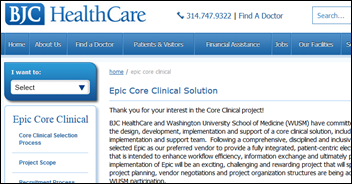

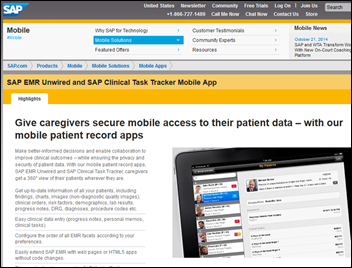
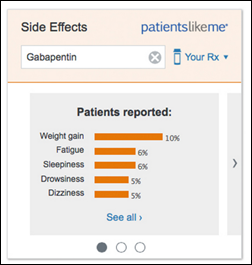
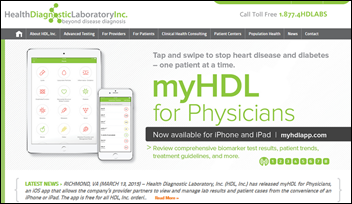
Don’t be so quick to judge patients self-reported side effects of meds they may be taking. Personal experience has shown that Drs typically down play side effects or fail to mention them altogether. It is through sites such as PatientsLikeMe, Inspire etc where one can confirm whether or not some of what they are experiencing is indeed a side effect of the meds.
I would never use an in-room coffee maker. I don’t trust that they are properly cleaned.
Unsure why “The Battle for the Customer Interface” is brilliant, or insightful. The customer interface was widely recognized as the reason for Apple’s success, and the reason more clinician’s like Epic. The anal retentive need to keep their product exclusive and control revenue stream is the reason brontosaurus EMR’s butt one another, despite their digitized nature. Cities of Ember (or St. Louis) will continue to employ their armies of programmers to figure out how to gobble up other data products as long as they can convince hospital CFO’s they didn’t blunder by investing millions on their data pyramid. Someday there will be a wafer thin window viewer to get to the data, but until then, no CIO will admit they screwed up for all the hospitals in their system.
Mr H listens to Yelawolf? I’m astounded. Maybe next week we can get a Readers Write on the new Earl Sweatshirt?
While I cannot make HIMSS (the ever decreasing value event of the year for our industry) I will miss the “line of the dead” at Starbucks or other coffee purveyors. Just remember, there is almost never a line to grab a Coke, etc. whilst the Starbuckians suffer their fate!
Re: Billing Experience
It seems like everyone has a similar story regarding billing issues in healthcare. My wife’s ultrasound resulted in a $135 bill (down from the $400+ that was billed to my insurer) that no one would take my money for, even a month after the service was provided. Not the insurer, not the imaging practice, not the health system that owned it, no one. I’ve never had to work so hard to PAY a bill in my life, but I felt I had to because of the prevalence of sudden-collections-syndrome in healthcare.
RE: HIStalkapalooza
After five years, I still do not understand the audacity of people feeling as though they are entitled to be invited to your (awesome) event that you and vendors pay out the nose for. Get over yourselves, people.
It’s pretty cool that Cam from Modern Family got hired on at NantHealth.
I was utterly thrilled to get my long-coveted invitation to the event-of-the-year but then thoroughly devastated to find I have an unavoidable conflict on my calendar. Oh Woe Is Me!! But I don’t want to be a no-show and so will let Lorre know she can recycle my invitation to some other lucky fan.
[From Mr. H] Sorry you can’t make it — thanks for the heads up. Just so folks know, though (since they’re asking Lorre dozens of times a day) we aren’t reissuing the invitations of those who can’t make it to someone else since I’ve already built in a high no-show rate, not to mention that the badges are already being printed. I’m assuming a full 40 percent no-show rate and if I guessed too high or if I repurpose existing invitations, I’m at risk for thousands of dollars in exceeding our guaranteed headcount. Being a party planner is not only a headache, it’s a financial roll of the dice.